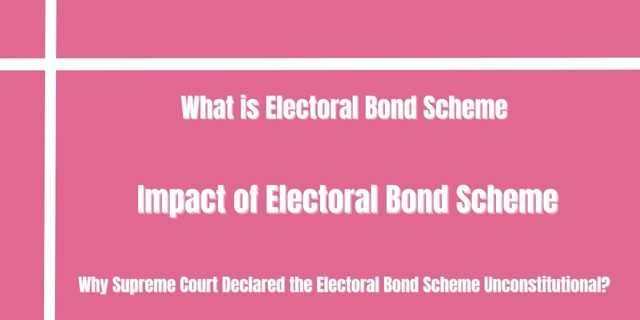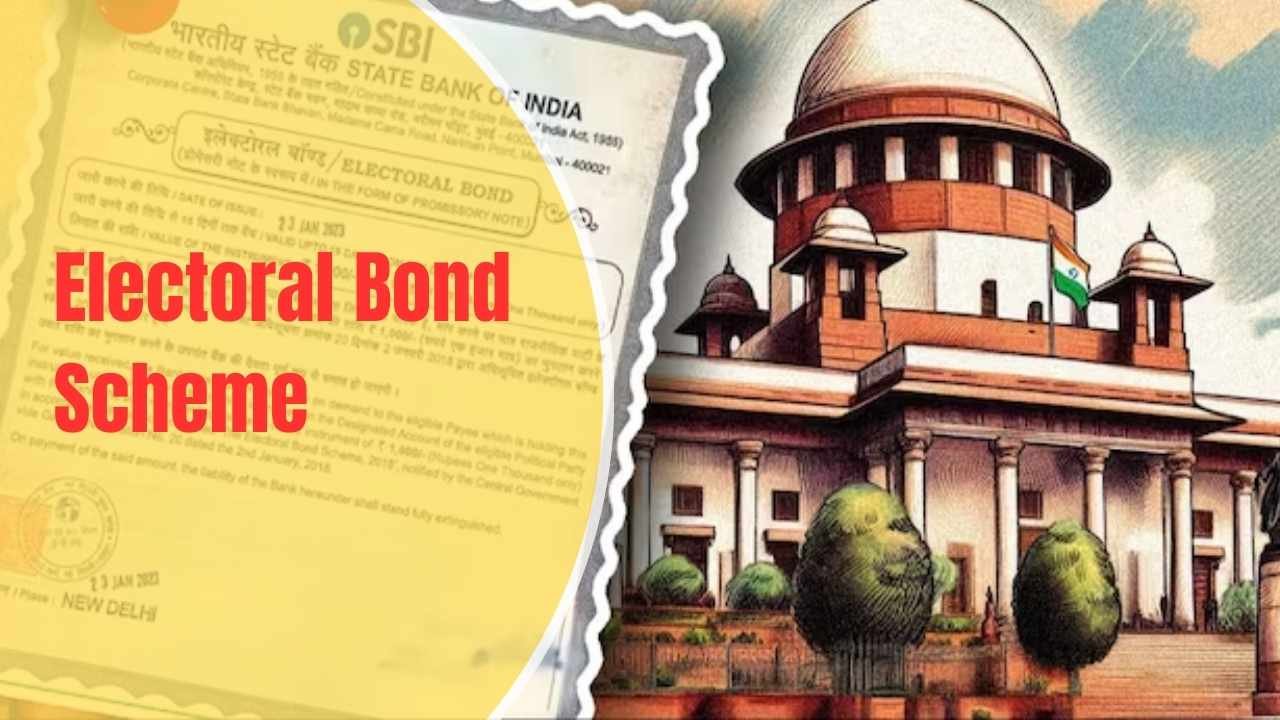The Supreme Court of India has declared its judgement on the Electoral Bond Scheme 2024. In 2017 the Government of India launched the Electoral Bond Scheme 2024. After the launch of the Electoral Bond, many political leaders in India challenged the Electoral Bond in the Supreme Court. There are two grounds in which the electoral Bond was challenged in the Supreme Court first, the non-disclosure of information under the scheme violated the right to information of citizens under Article 19(1)(a). Second, the unlimited corporate funding violated the principle of free and fair election and violated Article 14 of the Constitution.
What is the Electoral Bond Scheme 2024?
The Government of India launched the Electoral Bond Scheme in 2017. Under the Scheme donations to political parties in India can be made through anonymous promissory notes issued by recognised banks. The scheme also says that there is no restriction or limit for the donation made under the scheme. Any recognised authority can pay unlimited donations under the scheme. Further, political parties were not obligated to maintain a record of contributions received through electoral bonds. With the help of this scheme, the political party aims to gain as much funding as possible from recognised authorities across India.

Also Check: Electoralsearch.In
Why the Supreme Court Declared the Electoral Bond Scheme Unconstitutional?
The Electoral Bond Scheme was declared unconstitutional by the Supreme Court of India because it violated the right to Information to citizens and the right to free and fair elections in India. By making the amount of money hidden from the citizens of India the scheme violates the Right to Information to citizens under Article 19(1)(a) of the constitution. By making the funding under the scheme unlimited the scheme violates the right to free and fair elections in India because, for voters, information about the funding of political parties is essential for making electoral choices.
Key Highlights of the Electoral Bond Scheme
| Name of the scheme | Electoral Bond Scheme |
| Launched by | Government of India |
| Beneficiaries | Political party |
| Objective | Provide funds |
| Official website |
Supreme Court Electoral Bond Scheme Judgement
The Supreme Court of India has declared the Electoral Bond unconstitutional because it violates the Right to Information of the citizens and the right to free and fair elections in India. Chief Justice D.Y. Chandrachud And 5 other judges on the bench have declared their decision by declaring the scheme unconstitutional. The Electoral Bond violates Article 19(1)(a) and Article 14 constitution of India.
Disadvantages of the Scheme
- The Electoral Bond scheme violates Article 19(1)(a) of the Constitution of India which shows the right to information to the citizens of the country.
- This scheme also infringed Article 14 of India disturbing the right to free and fair elections in India.
- The Supreme Court has decided that corporate funding of political parties can include quid pro quo in terms of policymaking — so policies can be tweaked to favour the donors.
- An unlimited amount of funding under the Electoral Bond can lead to corruption among the political leaders of India.
Also Read: Voter ID Apply Online
Key Issue of Electoral Bond 2024
- The violations of Article 19 and Article 14 of the constitution of India are one of the most important issues in the Electoral Bond Scheme 2024.
- The transparency of the amount of funds under the scheme is one of the most important issues in the scheme.
- Not only transparency but also there is no limit on the amount of funds that are transferred under the scheme.
- The large amount of funds under the Electoral Bond may lead to quid pro quo in terms of policymaking.
Impact of the Scheme
- The electoral bond has a positive impact on all the political parties by giving them unlimited funds.
- This scheme has raised awareness about the violation of the Right to Information for the citizens of India.
- The Court directed the State Bank of India to submit details of Electoral Bonds purchased since April 12, 2019, to date to the Election Commission (‘EC’).
- The citizens of India can now assess whether the government did favours to do who providing funds to the political party in power and can vote accordingly.
FAQs
The Electoral Bond Yojana was launched in 2017 by the government of India.
This scheme violates Article 19(1)(a) of the Constitution of India which shows the right to information to the citizens of the country.
Because of the violation of the Right to Information and the Right to Free and Fair Elections in India, the Supreme Court has declared the scheme 2024 unconstitutional.
